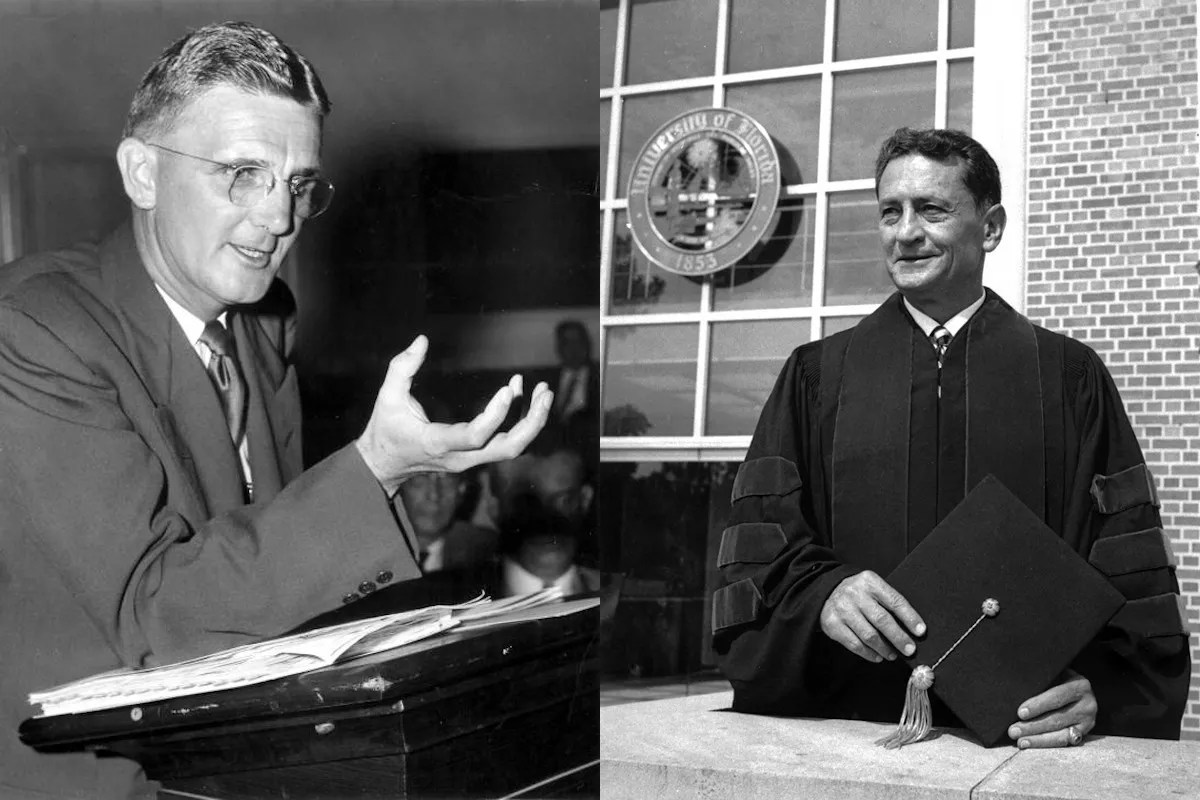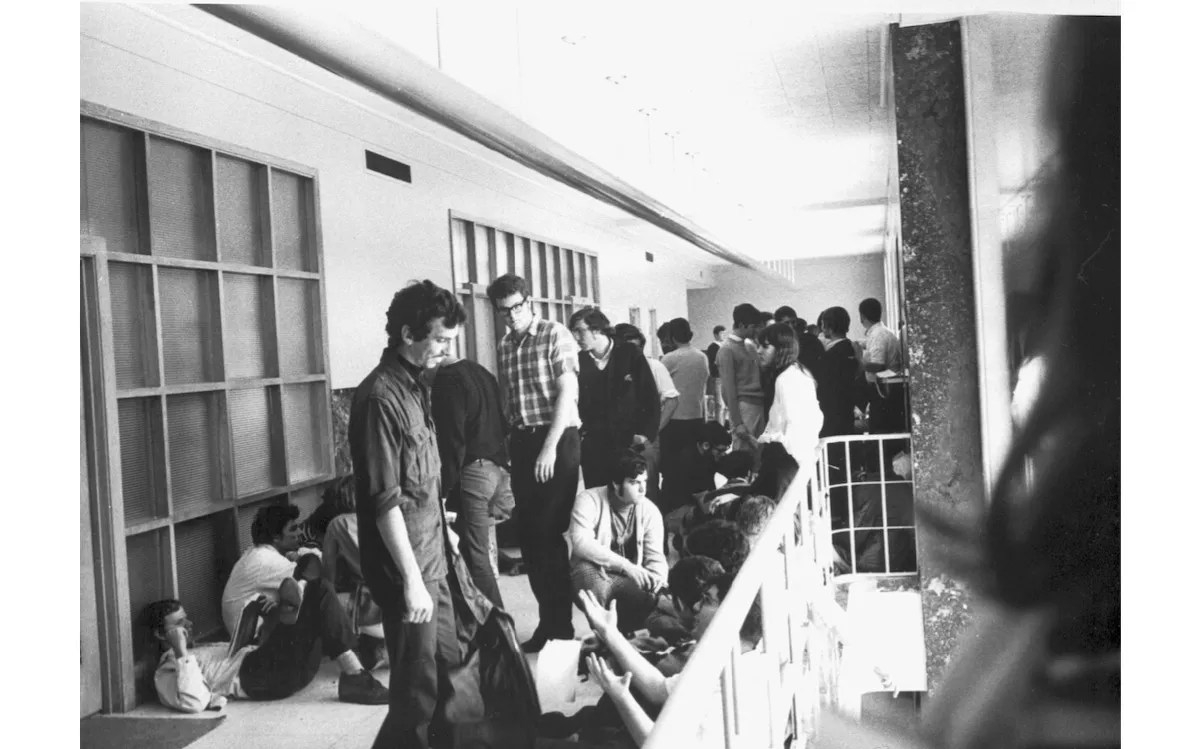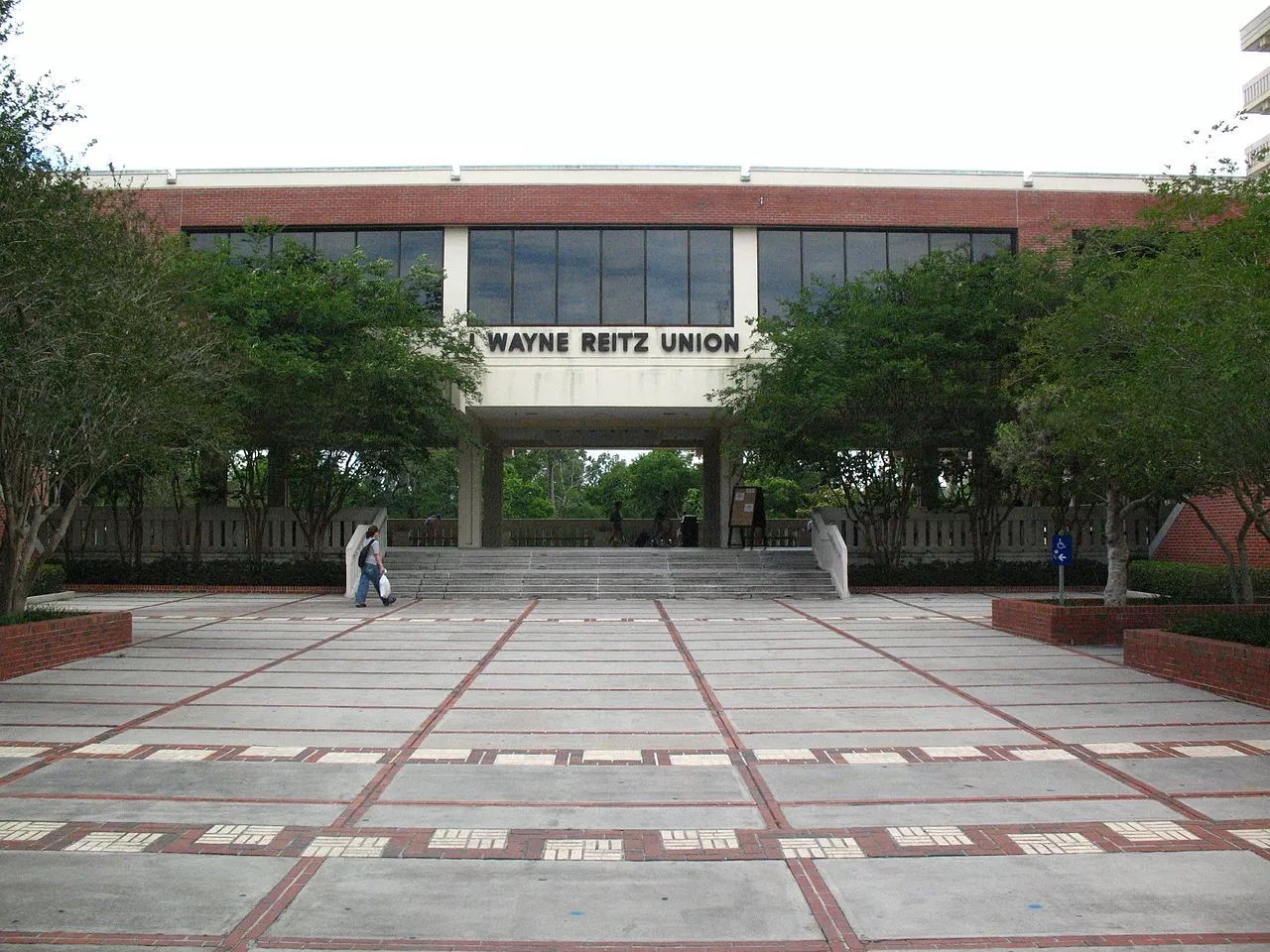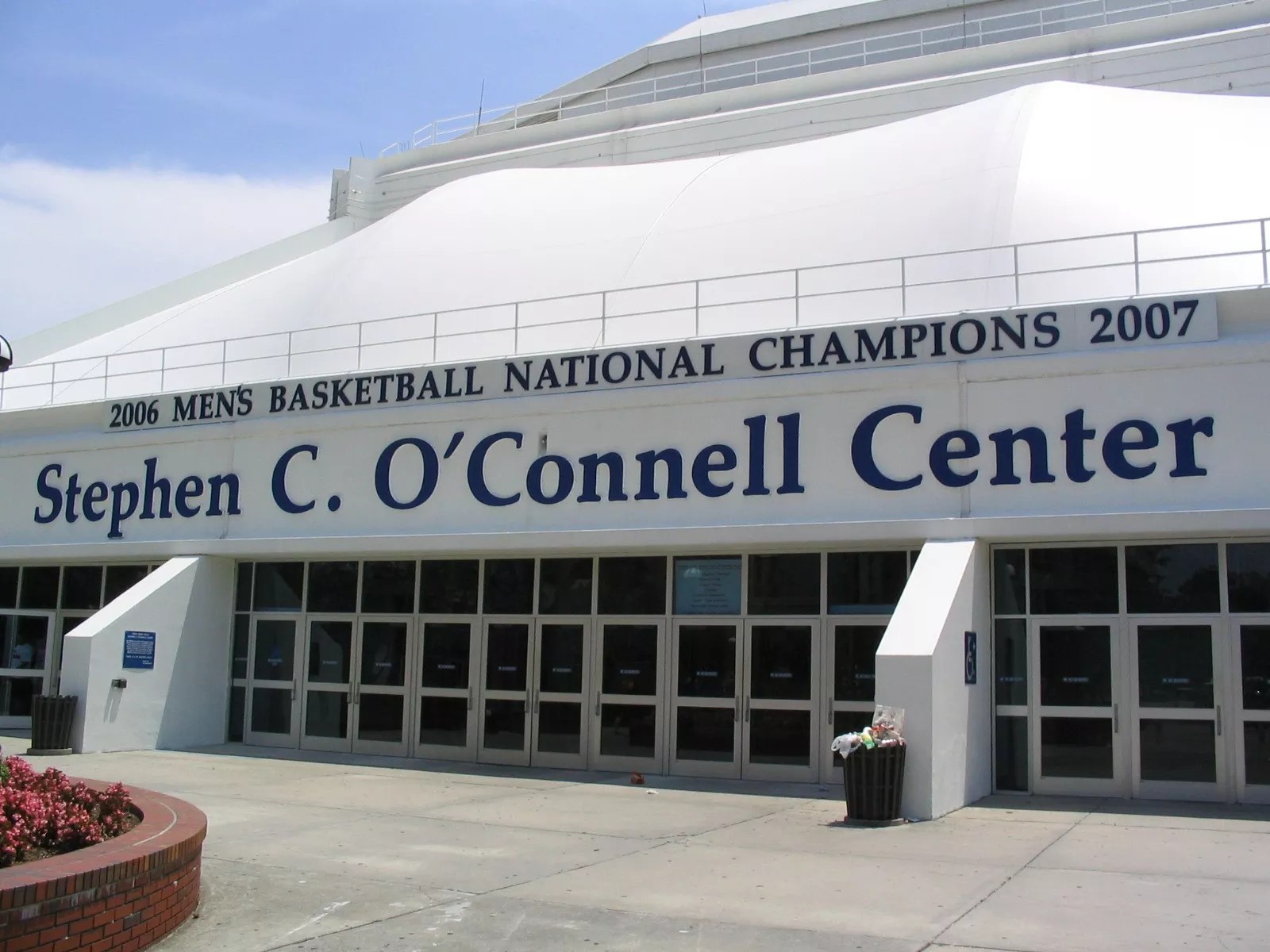
Photos courtesy of Associated Press/State of Florida Archives and the University of Florida Archives

Audio By Carbonatix
In the wake of global protests against police violence and racism, universities across the U.S. are taking steps to address their own racist vestiges.
Earlier this month, Oklahoma State University vowed to rename campus buildings that honor a segregationist. Monmouth University in New Jersey pledged to erase the name of Woodrow Wilson – a well-documented racist – from its most prominent building.
The University of Florida also made plans to tackle its racist legacy. Earlier this month, the university released a statement announcing that it will be ending its long practice of using prison labor, removing any Confederate monuments or namings “that UF can control,” and discontinuing the use of the “Gator bait” cheer, which evokes a particularly gruesome and racist practice.
But UF’s announcement, which was met with both praise and criticism, failed to address longtime demands to rename campus buildings honoring well-known segregationists Stephen C. O’Connell and J. Wayne Reitz. After years of student-led efforts to rename the buildings, a new petition is circulating to once again demand that the university rethink the building names.
O’Connell and Reitz, both former university presidents, were “practical segregationists” who “relied on tokenism, empty promises, and slow movement to stall the integration of the University of Florida’s student body and faculty,” according to a 2011 article published in the academic journal Florida Historical Quarterly. Nevertheless, two of the university’s most prominent buildings – the Reitz Union and the O’Connell Center arena – continue to display their names.
J. Wayne Reitz became the university’s president in 1955, one year after the landmark Brown v. Board of Education decision that deemed racial segregation in schools unconstitutional. Nevertheless, according to the Florida Historical Quarterly article by Jessica Clawson, Reitz did not prioritize integration at UF until 1962, when he quietly admitted seven Black undergraduate students.
“He admitted a handful of black students to placate the civil rights community without fundamentally changing the lives of white students on campus,” Clawson noted.

In 1971, students staged a sit-in outside President Stephen O’Connell’s office in support of civil rights.
Photo courtesy of the University of Florida Archives
Reitz also cooperated with the Florida legislature’s anti-communist Johns Committee, which investigated and essentially terrorized students and faculty suspected of being gay. Despite the fact that the committee’s tactics violated state law, Reitz defended the investigations. In a later interview, he expressed his own bigotry.
“As a matter of fact, I’ll be the first to admit that anyone who was a homosexual was a complete aberration,” Reitz said in 1988, according to the Gainesville Sun.
Reitz’s successor, Stephen C. O’Connell, came into the job with his own history of upholding discrimination. Before O’Connell took over at UF in 1967, he served on the Florida Supreme Court, where he oversaw a case brought by Black applicants who were denied admission to UF on the basis of race. The case was brought by Virgil Hawkins, a prospective law-school student who appealed to the court after his application was denied in 1949. In a 1957 decision, O’Connell was among the justices who ruled that the rejection was valid, according to the Tampa Bay Times.
For years, students’ demands that Reitz’s and O’Connell’s names be removed from the buildings have mostly been met with silence. But in light of recent developments, that might finally change. In a June 18 statement to students, current UF president Kent Fuchs pledged that the university must do better to address racism and injustice.
“It is past time for UF to commit and engage in this challenging, uncomfortable, transformational work,” Fuchs said.
But while Fuchs avowed that he’s “personally committed” to removing Confederate monuments and names, his letter made clear that renaming campus buildings dedicated to other problematic figures won’t be on the agenda any time soon. Instead, the university will convene a task force to develop a process to determine the fate of such namings.

The Reitz Union at UF
UF history professor Paul Ortiz tells New Times that while Fuchs’ overall statement was a “beautiful thing,” it merely echoed what generations of students and alumni have been trying to get him to understand for years.
Ortiz, who has taught at the university since 2008, says he has seen students petition to rename the O’Connell Center and Reitz Union every year – sometimes two or three times each year. In one of several student-led efforts over the years, activists with the Florida Dream Defenders in 2012 unsuccessfully pushed to rename the student union to instead commemorate Hawkins, the prospective law-school student who sued the university.
Ortiz believes that if an institution like UF is still paying homage to segregation, it makes it difficult for the university to also promote democracy, equality, and multiculturalism.
“I love the University of Florida. I love teaching here. I think it’s the best university in the country,” Ortiz says. “But the names on some of those buildings make me ashamed.”
He also notes that there’s nothing sacrilegious about asking for the removal of those names – the buildings in question aren’t churches, synagogues, or mosques. He says it’s time for people to acknowledge that many buildings at colleges and universities across the U.S are named after people who aren’t worth honoring.
“If we’re OK with having colleges and universities that promote separation, then leave the names on there, don’t change them whatsoever,” Ortiz says. “But if the goal is to try to and build a multicultural, multilingual, democratic society, then let’s pay honor to people who try to build that kind of society.”
The latest petition against the namings of Reitz Union and O’Connell Center, created on June 5 by 24-year-old UF grad student Anthony Rojas, repeats the decades-old demands. The petition, which now has more than 6,000 signatures, reads in bold lettering: “The actions of these individuals were wrong then, and refusing to hold them accountable by honoring them on our campus is wrong now.”
Rojas says that when he saw the university’s recent announcement, he was disappointed that school officials once again were dancing around requests to rename the buildings. But he believes that’s simply part of the culture at UF, where discussions involving diversity and inclusion have always been the “elephant in the room.”
“No one has ever answered directly, because I feel like there’s no direct answer for why you would have buildings named after these people,” Rojas tells New Times.

The Stephen C. O’Connell Center at UF
He also questions Fuchs’ logic for creating separate processes for removing Confederate names versus other problematic references.
“I think it’s very troubling when you draw a line as if to say, ‘OK, well, the Confederacy, that’s definitely unforgivable. But if they were segregationists and if they were racists, then we’re gonna put that up to a committee,'” Rojas says.
Rojas believes that the creation of a task force is concerning for several reasons. He fears students will be shut out of decision-making and also worries about who would be appointed to the committee, noting that Cindy O’Connell – the widow of Stephen O’Connell – served on UF’s Board of Trustees until 2011.
Ortiz, on the other hand, says he respects Fuchs’ idea to create a committee. While the process may not be as quick as some people might like, he says, it will allow faculty, students, and staff to sit down and discuss the issues together.
“I frankly wouldn’t want one individual making the decision, especially – and I don’t think President Fuchs would mind me saying this – especially a white man,” Ortiz says. “I don’t want another white man making a decision for the entire community.”
While students await the opportunity to discuss the names with UF officials, Rojas says it’s unfortunate that Black students will have to spend more time in buildings that stand as symbols of racial oppression.
“It’s just not something that should make anyone feel comfortable. It shouldn’t be OK,” he says.